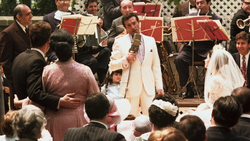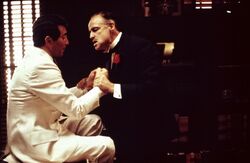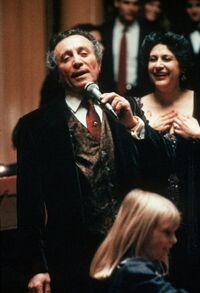- "Oh Godfather, I don't know what to do...
You can act like a man! What's the matter with you? Is this how you've turned out? A Hollywood finocchio who cries like a woman?" - ―Johnny Fontane and Vito Corleone[src]
Johnny Fontane was the godson of Don Vito Corleone and a famous crooner. He doesn't appear in the video game.
Biography
Born in Little Italy, Johnny Fontane grew up with Nino Valenti, who remained his firm friend. From an early age, Johnny had a talent for singing which was encouraged by his music teacher Sister Immaculata, and with the subtle help of his godfather, Vito Corleone, was able to break into showbusiness, often playing at clubs such as The Breslin. After finishing college, he married his childhood sweet heart Ginny, and had three children (Lisa, Angie and Trina), but later left her for Hollywood actress Margot Ashton, who turned out to be a floozy. This action estranged him from his godfather, who thought the act was highly disrespectful to Johnny's family.
Early in his career, Johnny was once assigned to Les Halley, a bandleader he wanted to break from, so Johnny called upon his Godfather for help. Don Vito visited the bandleader and offered to buy out Johnny's contract for $10,000. Halley turned it down.
Later, Don Vito visited Halley with Luca Brasi and made him an offer he couldn't refuse. While Luca held a gun to Halley's head, Don Vito pushed a release check for $1,000 in front of him and told him that either his brains or his signature would be on it. Halley signed.
Downfall

Johnny Fontane sings "I Have But One Heart".
It wasn't long after his second marriage fell apart that Johnny started developing a sore throat. His condition worsened until he could barely sing for ten minutes without suffering a hoarse throat for three days after. With his singing career looking grim, Johnny sought to make it in big movies, not the singing buddy pictures he had done but Oscar-winning blockbusters. Just such a movie was in production, a war film which featured a main character that seemed to be written for Johnny--as Johnny put it, he wouldn't even have to really act in order to play it. There was only one problem: Jack Woltz, the head of the studio, hated Fontane for having made off with one of his mistresses and spitefully refused Johnny the part, even though he knew it would put Johnny's career back on track.
Asking a favour

Johnny and his godfather, Vito Corleone.
Johnny arrived at Connie's wedding, where he entertained the guests before asking the Don if he could help him secure the part. The Don sent Tom Hagen on that night's redeye to Los Angeles in order to negotiate with Woltz. When Woltz still refused to budge, he woke up the next morning to find the severed head of his prize stud horse, Khartoum, in his bed. Realizing that he would likely be next if he didn't give in, Woltz granted Johnny the part. Around this time, his divorce from Ashton came through, and he began to rebuild his relationship with Ginny.
Superstardom

Johnny Fontane in 1979.
Don Corleone also helped Fontane by helping him win the Academy Award, in return, Johnny made a star out of his old friend Nino, who died from his heavy drinking habits shortly after appearing in a widely successful film. At about this time, Johnny had his third marriage to Annie McGowan, the host of a famous puppet show, but this marriage was short lived. Due to difficulties with the Gaming Commission, he wished to sell his share of the Castle in the Clouds, but asked for Michael's permission first. The two had hostile relations at this time, and Michael dismissed Fontane, claiming what he did with his money was none of Michael's concern.
Family life
- "Hey Mike, where you going, it's your favourite song!"
"I'm just going into the kitchen to listen to some Tony Bennett records." - ―Johnny Fontane and Michael Corleone[src]
Johnny's career began to drift at this time, and he earned the nickname 'One Take Johnny' from directors. However, he was still highly sought after, and was given the prestigious honour of being Grand Marshall of the Columbus Day Parade in New York. He also received the role of Christopher Columbus in a blockbuster picture starring Deanna Dunn and Oliver Smith-Christmas. At this time, his tumultous love life subsided, and Johnny finally settled on Francesca Corleone, daughter of his old friend Sonny Corleone, whom he stayed with.
Johnny continued to appear in films, but was not too much of a star to sing Michael Corleone's favourite song To Each His Own at a party celebrating Michael's receiving of the Order of Saint Sebastian. By this time, relations between the two men had recovered considerably.
Personality and traits
An impulsive man, Johnny loved his family deeply but allowed himself to become separated from them due to his wandering eye. He attempted to maintain good relations with all those he dealt with and became irritable with those who clearly disliked him, such as Tom Hagen.
Influences
Johhny Fontane is based on Frank Sinatra, who is believed to have used his mob connections to gain a part in From Here To Eternity.[2][3] Incidentally, the actor whohe replaced was Eli Wallach, who later played Don Altobello, a role written for Sinatra. The details of his split with his first wife are similar to those of Dean Martin.
The story of Luca Brasi threatening a band leader to release Johnny Fontane is based on an event in which Willie Moretti, a New Jersey mobster, held a gun to bandleader Tommy Dorsey's head to get Frank Sinatra released from a contract.[3]
The appearence of Jonny Fontane and presence of the heads of the Five Families at Connie's wedding is based on the wedding party of Salvatore Bonanno to Rosalie Profaci, which was attended by singer Tony Bennett and many mob bosses from across the United States.[4][5]
Al Martino, who portrays Johnny Fontane, was actually one of Mario Puzo's models for Fontane, as he once worked in a Mob-run nightblub. When Martino wanted to move on, he was severely beaten and soon after left for Europe, where he performed for eight years, before returning to the United States.[6]
Notes and references
- ↑ The Godfather
- ↑ Cowie, Peter (1997). The Godfather Book. Faber and Faber, p. 9. ISBN 0571190111.
- ↑ 3.0 3.1 Fact and Fiction in The Godfather. truTV.com.
- ↑ Capeci, Jerry (2005). The Complete Idiots Guide to the Mafia. Alpha, p. 213. ISBN 1592573053.
- ↑ Raab, Selwyn (2005). Five Families. Thomas Dunne Books. ISBN 0312300948.
- ↑ Lebo, Harlan (2005). The Godfather Legacy. Fireside, p. 98. ISBN 0743287770.
